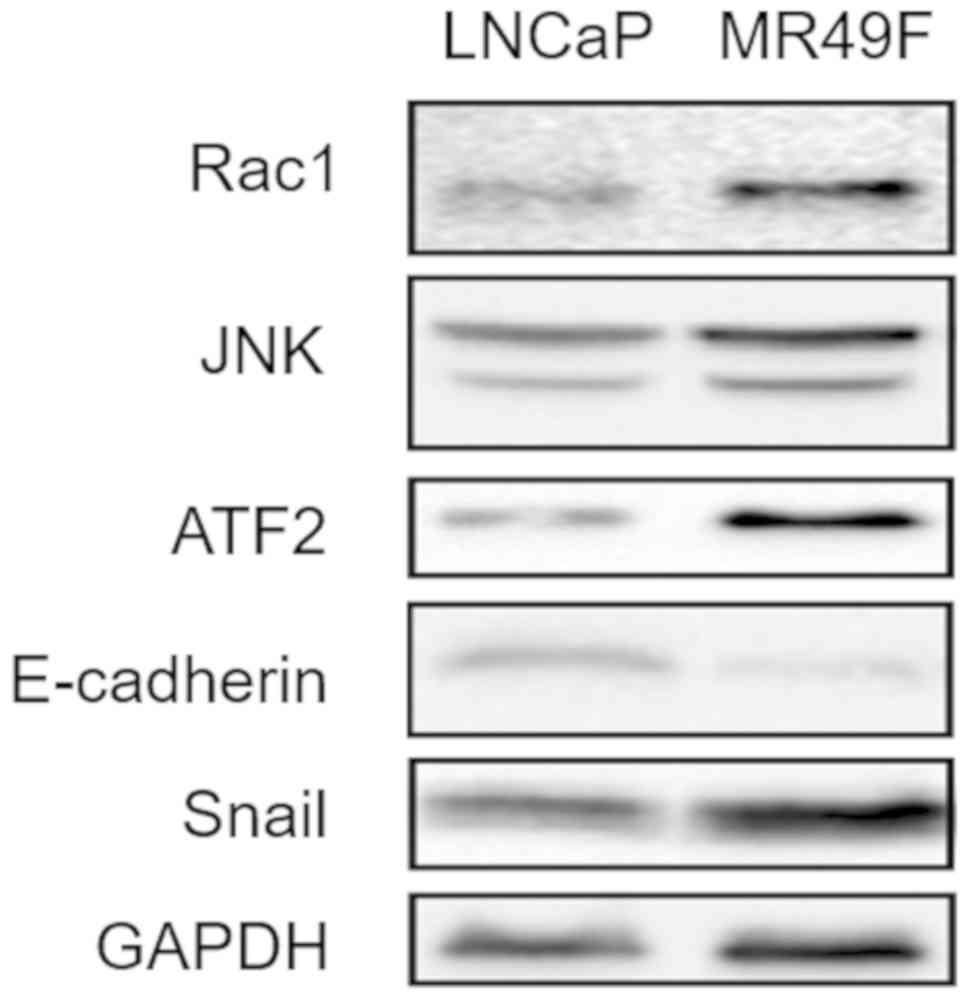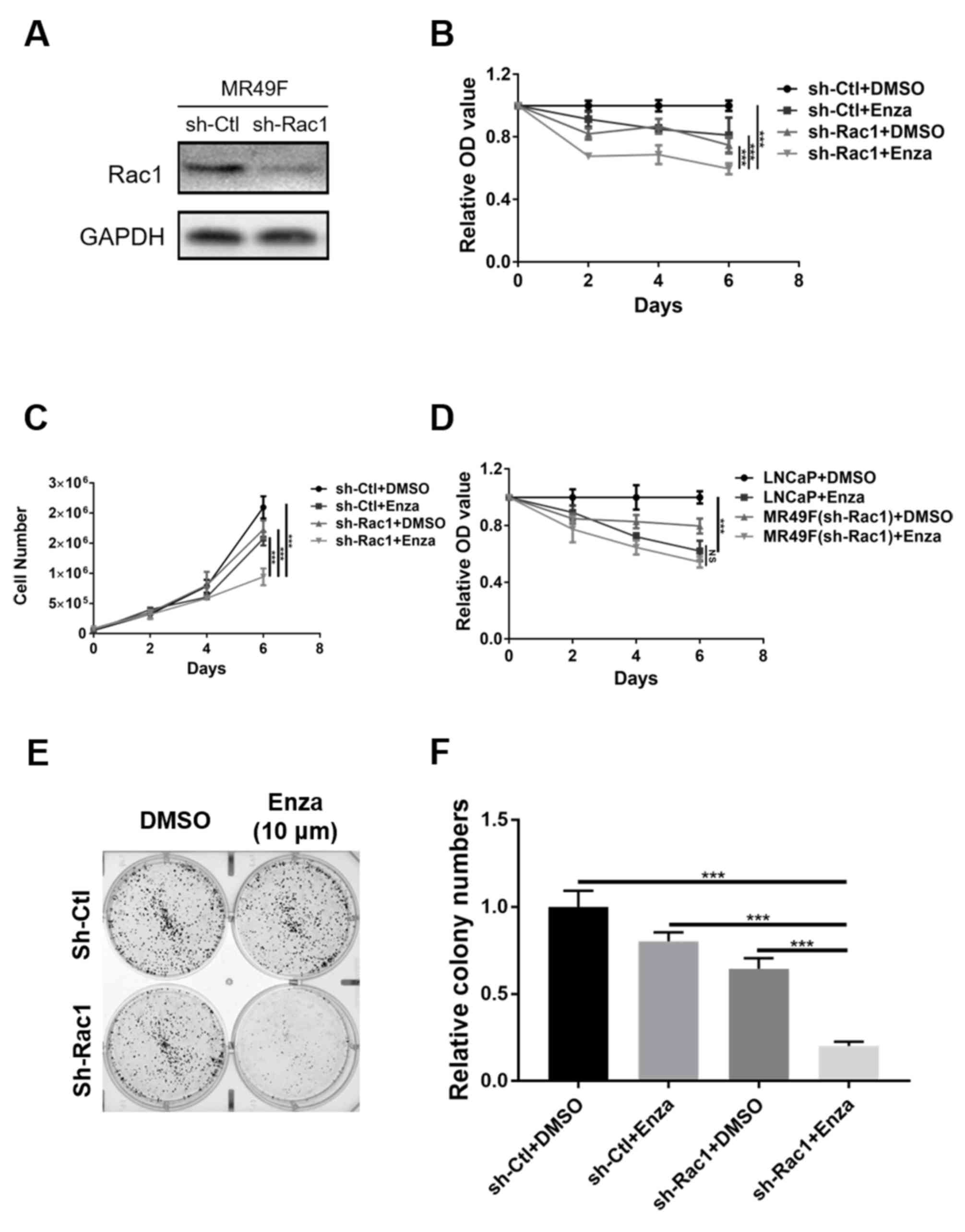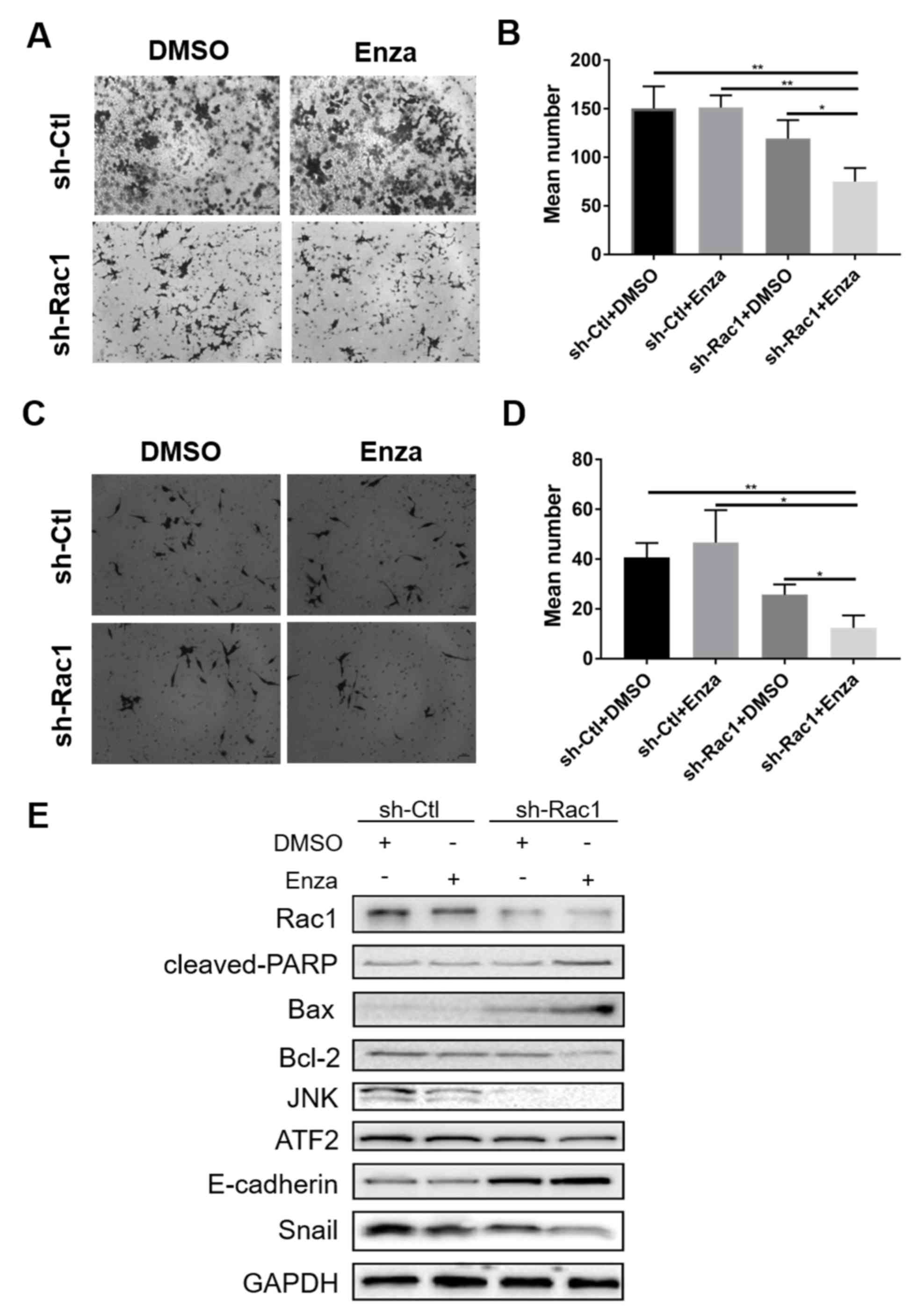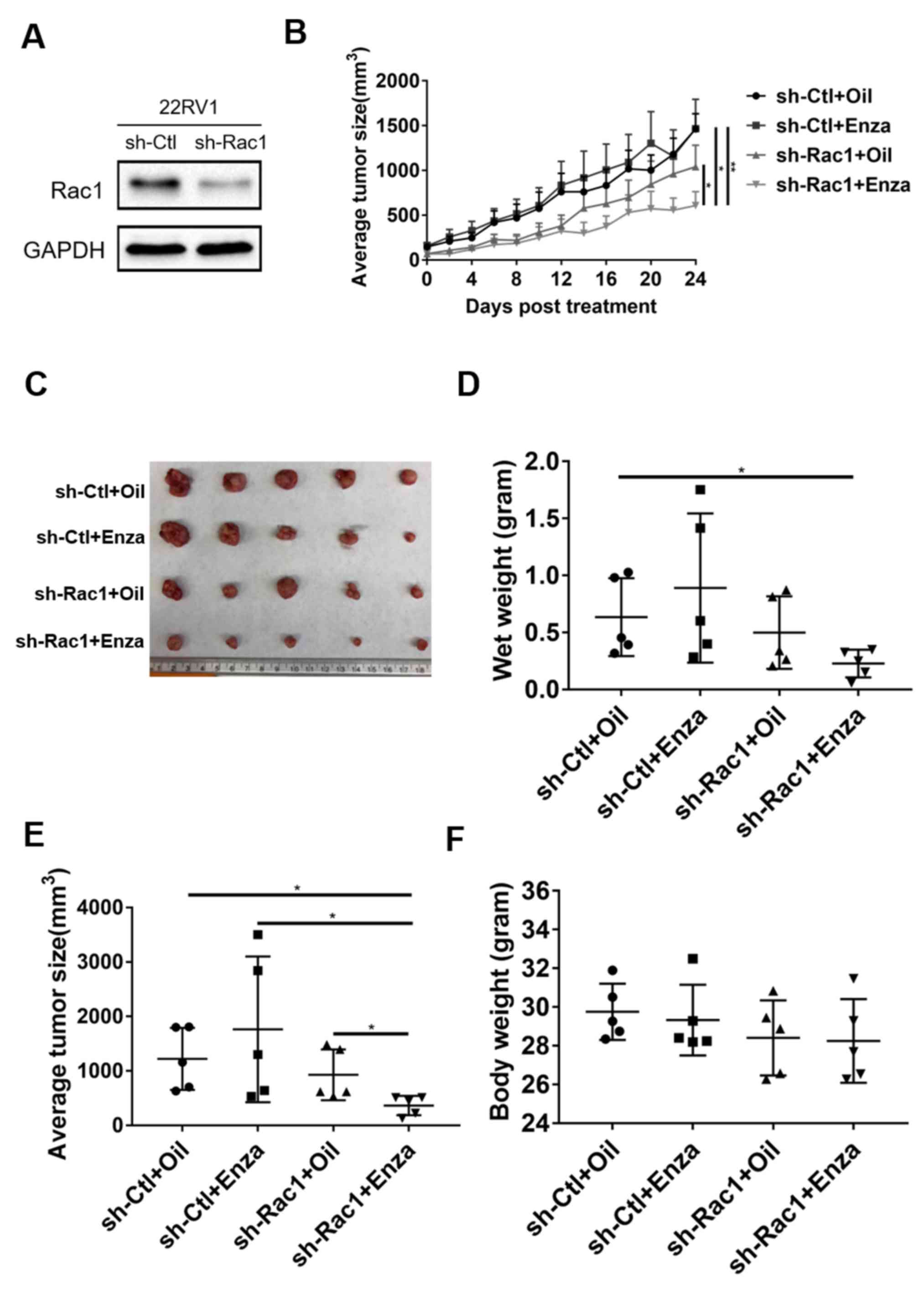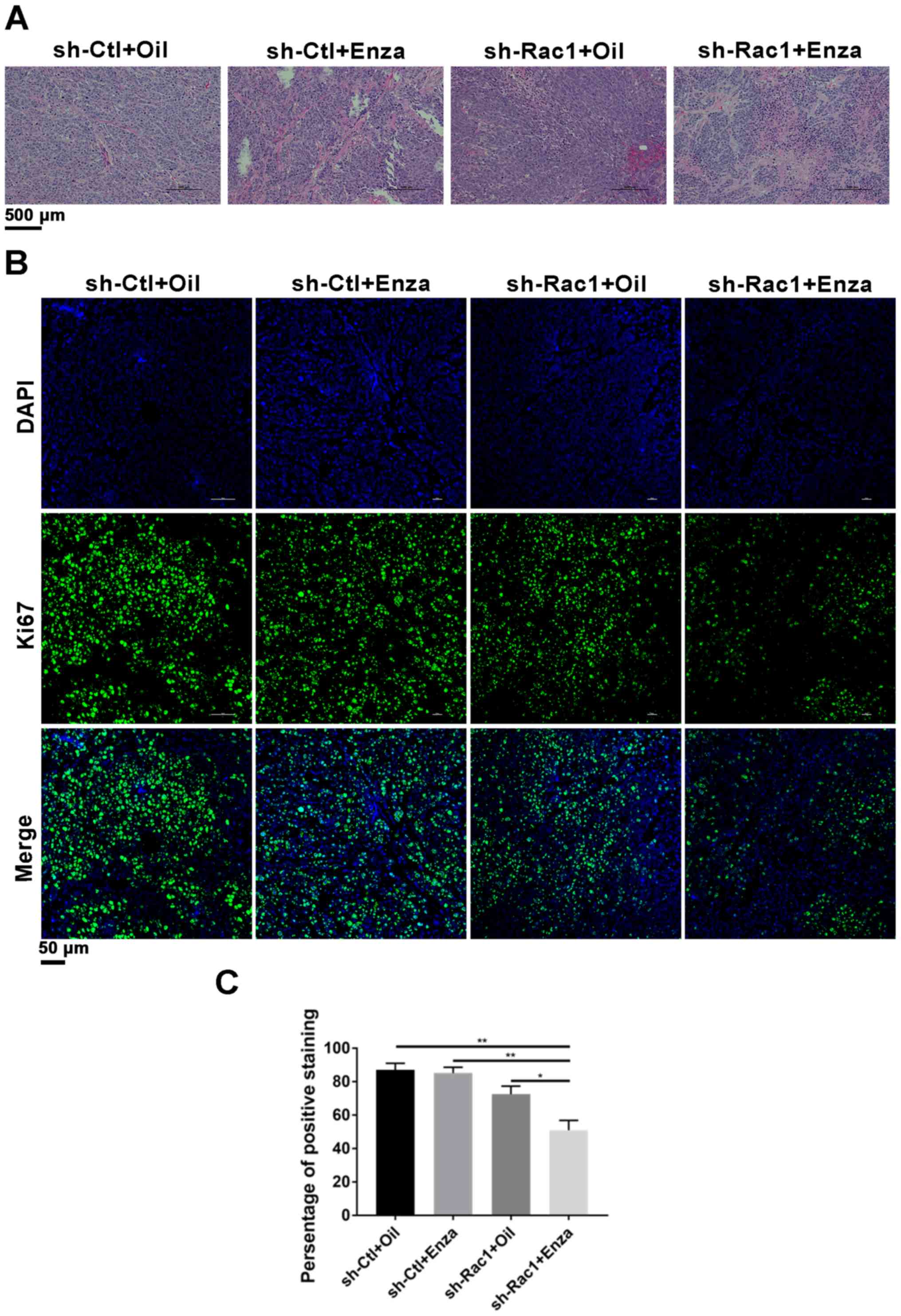|
1
|
Siegel RL, Miller KD and Jemal A: Cancer
statistics, 2019. CA Cancer J Clin. 69:7–34. 2019. View Article : Google Scholar : PubMed/NCBI
|
|
2
|
Hotte SJ and Saad F: Current management of
castrate-resistant prostate cancer. Curr Oncol. 17 (Suppl
2):S72–S79. 2010. View Article : Google Scholar : PubMed/NCBI
|
|
3
|
Siemens DR, Klotz L, Heidenreich A,
Chowdhury S, Villers A, Baron B, van Os S, Hasabou N, Wang F, Lin P
and Shore ND: Efficacy and safety of enzalutamide vs bicalutamide
in younger and older patients with metastatic castration resistant
prostate cancer in the TERRAIN trial. J Urol. 199:147–154. 2018.
View Article : Google Scholar : PubMed/NCBI
|
|
4
|
Beer TM, Armstrong AJ, Rathkopf DE, Loriot
Y, Sternberg CN, Higano CS, Iversen P, Bhattacharya S, Carles J,
Chowdhury S, et al: Enzalutamide in metastatic prostate cancer
before chemotherapy. N Engl J Med. 371:424–433. 2014. View Article : Google Scholar : PubMed/NCBI
|
|
5
|
Cardama GA, Alonso DF, Gonzalez N, Maggio
J, Gomez DE, Rolfo C and Menna PL: Relevance of small GTPase Rac1
pathway in drug and radio-resistance mechanisms: Opportunities in
cancer therapeutics. Crit Rev Oncol Hematol. 124:29–36. 2018.
View Article : Google Scholar : PubMed/NCBI
|
|
6
|
Lin Y, Fu F, Lv J, Wang M, Li Y, Zhang J
and Wang C: Identification of potential key genes for HER-2
positive breast cancer based on bioinformatics analysis. Medicine
(Baltimore). 99:e184452020. View Article : Google Scholar : PubMed/NCBI
|
|
7
|
Xia L, Lin J, Su J, Oyang L, Wang H, Tan
S, Tang Y, Chen X, Liu W, Luo X, et al: Diallyl disulfide inhibits
colon cancer metastasis by suppressing Rac1-mediated
epithelial-mesenchymal transition. Onco Targets Ther. 12:5713–5728.
2019. View Article : Google Scholar : PubMed/NCBI
|
|
8
|
Zhou Y, Liao Q, Han Y, Chen J, Liu Z, Ling
H, Zhang J, Yang W, Oyang L, Xia L, et al: Rac1 overexpression is
correlated with epithelial mesenchymal transition and predicts poor
prognosis in non-small cell lung cancer. J Cancer. 7:2100–2109.
2016. View Article : Google Scholar : PubMed/NCBI
|
|
9
|
Leng R, Liao G, Wang H, Kuang J and Tang
L: Rac1 expression in epithelial ovarian cancer: Effect on cell EMT
and clinical outcome. Med Oncol. 32:3292015. View Article : Google Scholar : PubMed/NCBI
|
|
10
|
Bid HK, Roberts RD, Manchanda PK and
Houghton PJ: RAC1: An emerging therapeutic option for targeting
cancer angiogenesis and metastasis. Mol Cancer Ther. 12:1925–1934.
2013. View Article : Google Scholar : PubMed/NCBI
|
|
11
|
Engers R, Ziegler S, Mueller M, Walter A,
Willers R and Gabbert HE: Prognostic relevance of increased Rac
GTPase expression in prostate carcinomas. Endocr Relat Cancer.
14:245–256. 2007. View Article : Google Scholar : PubMed/NCBI
|
|
12
|
Hofbauer SW, Krenn PW, Ganghammer S,
Asslaber D, Pichler U, Oberascher K, Henschler R, Wallner M,
Kerschbaum H, Greil R and Hartmann TN: Tiam1/Rac1 signals
contribute to the proliferation and chemoresistance, but not
motility, of chronic lymphocytic leukemia cells. Blood.
123:2181–2188. 2014. View Article : Google Scholar : PubMed/NCBI
|
|
13
|
Liu W, Chen G, Sun L, Zhang Y, Han J, Dai
Y, He J, Shi S and Chen B: TUFT1 Promotes triple negative breast
cancer metastasis, stemness, and chemoresistance by up-regulating
the Rac1/β-catenin pathway. Front Oncol. 9:6172019. View Article : Google Scholar : PubMed/NCBI
|
|
14
|
Arnold CR, Abdelmoez A, Thurner G, Debbage
P, Lukas P, Skvortsov S and Skvortsova II: Rac1 as a
multifunctional therapeutic target to prevent and combat cancer
metastasis. Oncoscience. 1:513–521. 2014. View Article : Google Scholar : PubMed/NCBI
|
|
15
|
Skvortsov S, Dudás J, Eichberger P,
Witsch-Baumgartner M, Loeffler-Ragg J, Pritz C, Schartinger VH,
Maier H, Hall J, Debbage P, et al: Rac1 as a potential therapeutic
target for chemo-radioresistant head and neck squamous cell
carcinomas (HNSCC). Br J Cancer. 110:2677–2687. 2014. View Article : Google Scholar : PubMed/NCBI
|
|
16
|
Hazar-Rethinam M, Merida de Long L, Gannon
OM, Boros S, Vargas AC, Dzienis M, Mukhopadhyay P, Saenz-Ponce N,
Dantzic DDE, Simpson F and Saunders NA: RacGAP1 is a novel
downstream effector of E2F7-dependent resistance to doxorubicin and
is prognostic for overall survival in squamous cell carcinoma. Mol
Cancer Ther. 14:1939–1950. 2015. View Article : Google Scholar : PubMed/NCBI
|
|
17
|
Yoon C, Cho SJ, Chang KK, Park DJ, Ryeom
SW and Yoon SS: Role of Rac1 pathway in epithelial-to-mesenchymal
transition and cancer stem-like cell phenotypes in gastric
adenocarcinoma. Mol Cancer Res. 15:1106–1116. 2017. View Article : Google Scholar : PubMed/NCBI
|
|
18
|
Zeng RJ, Zheng CW, Gu JE, Zhang HX, Xie L,
Xu LY and Li EM: RAC1 inhibition reverses cisplatin resistance in
esophageal squamous cell carcinoma and induces downregulation of
glycolytic enzymes. Mol Oncol. 13:2010–2030. 2019. View Article : Google Scholar : PubMed/NCBI
|
|
19
|
Farah E, Li C, Cheng L, Kong Y, Lanman NA,
Pascuzzi P, Lorenz GR, Zhang Y, Ahmad N, Li L, et al: NOTCH
signaling is activated in and contributes to resistance in
enzalutamide-resistant prostate cancer cells. J Biol Chem.
294:8543–8554. 2019. View Article : Google Scholar : PubMed/NCBI
|
|
20
|
Aruga N, Kijima H, Masuda R, Onozawa H,
Yoshizawa T, Tanaka M, Inokuchi S and Iwazaki M:
Epithelial-mesenchymal transition (EMT) is correlated with
patient's prognosis of lung squamous cell carcinoma. Tokai J Exp
Clin Med. 43:5–13. 2018.PubMed/NCBI
|
|
21
|
Wen L, Valderrama A, Costantino ME and
Simmons S: Real-world treatment patterns in patients with
castrate-resistant prostate cancer and bone metastases. Am Health
Drug Benefits. 12:142–149. 2019.PubMed/NCBI
|
|
22
|
Antonarakis ES, Lu C, Wang H, Luber B,
Nakazawa M, Roeser JC, Chen Y, Mohammad TA, Chen Y, Fedor HL, et
al: AR-V7 and resistance to enzalutamide and abiraterone in
prostate cancer. N Engl J Med. 371:1028–1038. 2014. View Article : Google Scholar : PubMed/NCBI
|
|
23
|
Althaus A and Kibel A: Words of wisdom.
Re: Enzalutamide in metastatic prostate cancer before chemotherapy.
Eur Urol. 67:1742015. View Article : Google Scholar : PubMed/NCBI
|
|
24
|
Hu R, Lu C, Mostaghel EA, Yegnasubramanian
S, Gurel M, Tannahill C, Edwards J, Isaacs WB, Nelson PS, Bluemn E,
et al: Distinct transcriptional programs mediated by the
ligand-dependent full-length androgen receptor and its splice
variants in castration-resistant prostate cancer. Cancer Res.
72:3457–3462. 2012. View Article : Google Scholar : PubMed/NCBI
|
|
25
|
Kong Y, Cheng L, Mao F, Zhang Z, Zhang Y,
Farah E, Bosler J, Bai Y, Ahmad N, Kuang S, et al: Inhibition of
cholesterol biosynthesis overcomes enzalutamide resistance in
castration-resistant prostate cancer (CRPC). J Biol Chem.
293:14328–14341. 2018. View Article : Google Scholar : PubMed/NCBI
|
|
26
|
Zhang Z, Cheng L, Li J, Farah E, Atallah
NM, Pascuzzi PE, Gupta S and Liu X: Inhibition of the wnt/β-catenin
pathway overcomes resistance to enzalutamide in
castration-resistant prostate cancer. Cancer Res. 78:3147–3162.
2018.PubMed/NCBI
|
|
27
|
Bai Y, Zhang Z, Cheng L, Wang R, Chen X,
Kong Y, Feng F, Ahmad N, Li L and Liu X: Inhibition of enhancer of
zeste homolog 2 (EZH2) overcomes enzalutamide-resistance in
castration-resistance prostate cancer. J Biol Chem. 294:9911–9923.
2019. View Article : Google Scholar : PubMed/NCBI
|
|
28
|
Chen X, Liu J, Cheng L, Li C, Zhang Z, Bai
Y, Wang R, Han T, Huang C, Kong Y, et al: Inhibition of
noncanonical Wnt pathway overcomes enzalutamide resistance in
castration-resistant prostate cancer. Prostate. 80:256–266. 2020.
View Article : Google Scholar : PubMed/NCBI
|
|
29
|
Shin S, Buel GR, Nagiec MJ, Han MJ, Roux
PP, Blenis J and Yoon SO: ERK2 regulates epithelial-to-mesenchymal
plasticity through DOCK10-dependent Rac1/FoxO1 activation. Proc
Natl Acad Sci USA. 116:2967–2976. 2019. View Article : Google Scholar : PubMed/NCBI
|
|
30
|
Zhao J, Jie Q, Li G, Li Y, Liu B, Li H,
Luo J, Qin X, Li Z and Wei Y: Rac1 promotes the survival of H9c2
cells during serum deficiency targeting JNK/c-JUN/Cyclin-D1 and
AKT2/MCL1 pathways. Int J Med Sci. 15:1062–1071. 2018. View Article : Google Scholar : PubMed/NCBI
|
|
31
|
Brabletz T, Kalluri R, Nieto MA and
Weinberg RA: EMT in cancer. Nat Rev Cancer. 18:128–134. 2018.
View Article : Google Scholar : PubMed/NCBI
|
|
32
|
Mohammadinejad R, Biagioni A, Arunkumar G,
Shapiro R, Chang KC, Sedeeq M, Taiyab A, Hashemabadi M, Pardakhty
A, Mandegary A, et al: EMT signaling: Potential contribution of
CRISPR/Cas gene editing. Cell Mol Life Sci. 2020.(ahead of print).
View Article : Google Scholar : PubMed/NCBI
|
|
33
|
Raoof S, Mulford IJ, Frisco-Cabanos H,
Nangia V, Timonina D, Labrot E, Hafeez N, Bilton SJ, Drier Y, Ji F,
et al: Targeting FGFR overcomes EMT-mediated resistance in EGFR
mutant non-small cell lung cancer. Oncogene. 38:6399–6413. 2019.
View Article : Google Scholar : PubMed/NCBI
|
|
34
|
Tucci M, Zichi C, Buttigliero C, Vignani
F, Scagliotti GV and Di Maio M: Enzalutamide-resistant
castration-resistant prostate cancer: Challenges and solutions.
OncoTargets Ther. 11:7353–7368. 2018. View Article : Google Scholar
|
|
35
|
Liu Q, Tong D, Liu G, Xu J, Do K, Geary K,
Zhang D, Zhang J, Zhang Y, Li Y, et al: Metformin reverses prostate
cancer resistance to enzalutamide by targeting TGF-β1/STAT3
axis-regulated EMT. Cell Death Dis. 8:e30072017. View Article : Google Scholar : PubMed/NCBI
|
|
36
|
Ware KE, Somarelli JA, Schaeffer D, Li J,
Zhang T, Park S, Patierno SR, Freedman J, Foo WC, Garcia-Blanco MA
and Armstrong AJ: Snail promotes resistance to enzalutamide through
regulation of androgen receptor activity in prostate cancer.
Oncotarget. 7:50507–50521. 2016. View Article : Google Scholar : PubMed/NCBI
|
|
37
|
Fan M, Xu Y, Hong F, Gao X, Xin G, Hong H,
Dong L and Zhao X: Rac1/β-catenin signalling pathway contributes to
trophoblast cell invasion by targeting snail and MMP9. Cell Physiol
Biochem. 38:1319–1332. 2016. View Article : Google Scholar : PubMed/NCBI
|
|
38
|
Li X, Zhu J, Liu Y, Duan C, Chang R and
Zhang C: MicroRNA-331-3p inhibits epithelial-mesenchymal transition
by targeting ErbB2 and VAV2 through the Rac1/PAK1/β-catenin axis in
non-small-cell lung cancer. Cancer Sci. 110:1883–1896.
2019.PubMed/NCBI
|
|
39
|
Du GS, Qiu Y, Wang WS, Peng K, Zhang ZC,
Li XS, Xiao WD and Yang H: Knockdown on aPKC-ι inhibits
epithelial-mesenchymal transition, migration and invasion of
colorectal cancer cells through Rac1-JNK pathway. Exp Mol Pathol.
107:57–67. 2019. View Article : Google Scholar : PubMed/NCBI
|















